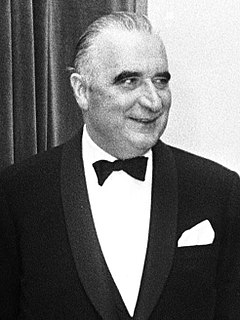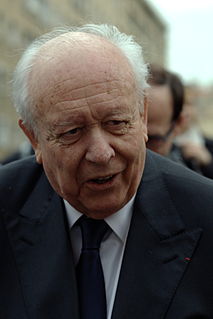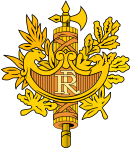Martinique is an overseas Territorial collectivity of France, with the same political status as regions and departments in mainland France. The administrative centre of Martinique is located in Fort-de-France.

The President of the French Republic is the executive head of state of France in the French Fifth Republic. In French terms, the presidency is the supreme magistracy of the country.

The European Union created a Committee of the Regions to represent Regions of Europe as the layer of EU government administration directly below the nation-state level. The Committee has its headquarters in Brussels.

The Fifth Republic, France's current republican system of government, was established by Charles de Gaulle under the Constitution of the Fifth Republic on 4 October 1958. The Fifth Republic emerged from the collapse of the Fourth Republic, replacing the former parliamentary republic with a semi-presidential, or dual-executive, system that split powers between a Prime Minister as head of government and a President as head of state. De Gaulle, who was the first French President elected under the Fifth Republic in December 1958, believed in a strong head of state, which he described as embodying l'esprit de la nation.

Georges Jean Raymond Pompidou was Prime Minister of France from 1962 to 1968—the longest tenure in the position's history—and later President of the French Republic from 1969 until his death in 1974. He had long been a top aide to president Charles de Gaulle. As president, he was a moderate conservative who repaired France's relationship with the United States and maintained positive relations with the newly independent former colonies in Africa.
The overseas departments and regions of France are departments of France which are outside metropolitan France, the European part of France. They have nearly the same political status as metropolitan departments, although special constitutional provisions allow them greater autonomy and they are excluded from certain domestic statistics, such as the unemployment rate.
In France, the Gaullist Party is usually used to refer to the largest party professing to be Gaullist. Gaullism claim to transcend the left-right divide but in practice the current Gaullist party is the centre-right Republicans.

Alain Émile Louis Marie Poher was a French centrist politician, affiliated first with the Popular Republican Movement and later with the Democratic Centre. He served as a Senator for Val-de-Marne from 1946 to 1995. He was President of the Senate from 3 October 1968 to 1 October 1992 and, in that capacity, served twice as the country's interim president. A leading candidate in the 1969 presidential election, he was defeated by Georges Pompidou in the second round.

The Senate is the upper house of the French Parliament. Indirectly elected by elected officials, it represents territorial collectivities of the Republic and French citizens living abroad. The Senate enjoys less prominence than the lower house, the directly elected National Assembly; debates in the Senate tend to be less tense and generally receive less media coverage.

France is a representative democracy. Public officials in the legislative and executive branches are either elected by the citizens or appointed by elected officials. Referendums may also be called to consult the French citizenry directly on a particular question, especially one which concerns amendment to the Constitution.

The Constitution of the Italian Republic was enacted by the Constituent Assembly on 22 December 1947, with 453 votes in favour and 62 against. The text, which has since been amended 15 times, was promulgated in the extraordinary edition of Gazzetta Ufficiale No. 298 on 27 December 1947. The Constituent Assembly was elected by universal suffrage on 2 June 1946, at the same time as a referendum on the abolition of the monarchy. The Constitution came into force on 1 January 1948, one century after the Statuto Albertino had been enacted. Although the latter remained in force after Benito Mussolini's March on Rome in 1922, it had become devoid of substantive value.

The Corsican Assembly is the unicameral legislative body of the territorial collectivity of Corsica. It has its seat at the Grand Hôtel d'Ajaccio et Continental, in the Corsican capital of Ajaccio. After the 2017 territorial elections, the assembly will be expanded from 51 to 63 seats, with the executive council expanding from 9 to 11 members.
The French overseas collectivities, like the French regions, are first-order administrative divisions of France, but have a semi-autonomous status. The COMs include some former French overseas colonies and other French overseas entities with a particular status, all of which became COMs by constitutional reform on 28 March 2003. The COMs should not be confused with the overseas regions and overseas departments, which have the same status as Mainland France but are just located outside Europe. As integral parts of France, overseas collectivities are represented in the National Assembly, Senate and Economic and Social Council. Only one COM, Saint Martin, is part of the European Union and can vote to elect members of the European Parliament (MEPs). The Pacific COMs use the CFP franc, a currency pegged to the euro, whereas the Atlantic COMs use the euro directly. As of 31 March 2011, there were five COMs:

The 1969 French presidential election took place on 1 June and 15 June 1969. It occurred due to the resignation of President Charles de Gaulle on 28 April 1969. De Gaulle had decided to consult the voters by referendum about regionalisation and the reform of the Senate, and he had announced he would resign if it resulted in a "no" vote. On 27 April, 53.5% of the voters had voted "no".

The Senate of Kazakhastan is the upper house of two chambers in Kazakhstan's legislature, known as the Parliament (Parlamenti). The Senate is composed of elected members - two from each region, the city of republican importance (Almaty) and the capital city of the Republic of Kazakhstan at joint sessions of the members of all representative bodies of respective regions, city of the republican importance and the capital city of the Republic.

Jean-Claude Gaudin is a French politician for The Republicans. He has been Mayor of Marseille since 1995.

Gaston Monnerville was a French politician and lawyer.

A referendum on the direct election of the President was held in France on 28 October 1962. The question was whether to have the President of the French Republic elected by direct popular vote, rather than by an electoral college. It was approved by 62.3% of voters with a 77.0% turnout. However, the reform was controversial because it strengthened the executive at the expense of Parliament, and because of the disputed constitutionality of the procedure used.
Christophe Kalenzaga was a politician from Burkina Faso who was elected for French Upper Volta to the French Senate in 1948. On November 14, 1948 he was elected, on May 18, 1952 and June 8, 1958 reelected. On July 15, 1959 his mandate ended due to the Termination of mandate pursuant to Order No. 58-974 of October 17, 1958, relating to the provisional operation of public authorities. From February 21, 1964 till 1967 he was Ambassador of the Republic of Upper Volta to Bonn.
The 2017 Corsican territorial elections were held on 3 and 10 December 2017 to elect 63 members of the Corsican Assembly who in turn will determine the composition of the Executive Council of Corsica. The elections, held only two years after the 2015 territorial elections, were called as a result of the planned creation of a single collectivity within Corsica resulting from the mergers of two departments and the existing territorial collectivity of Corsica.




















